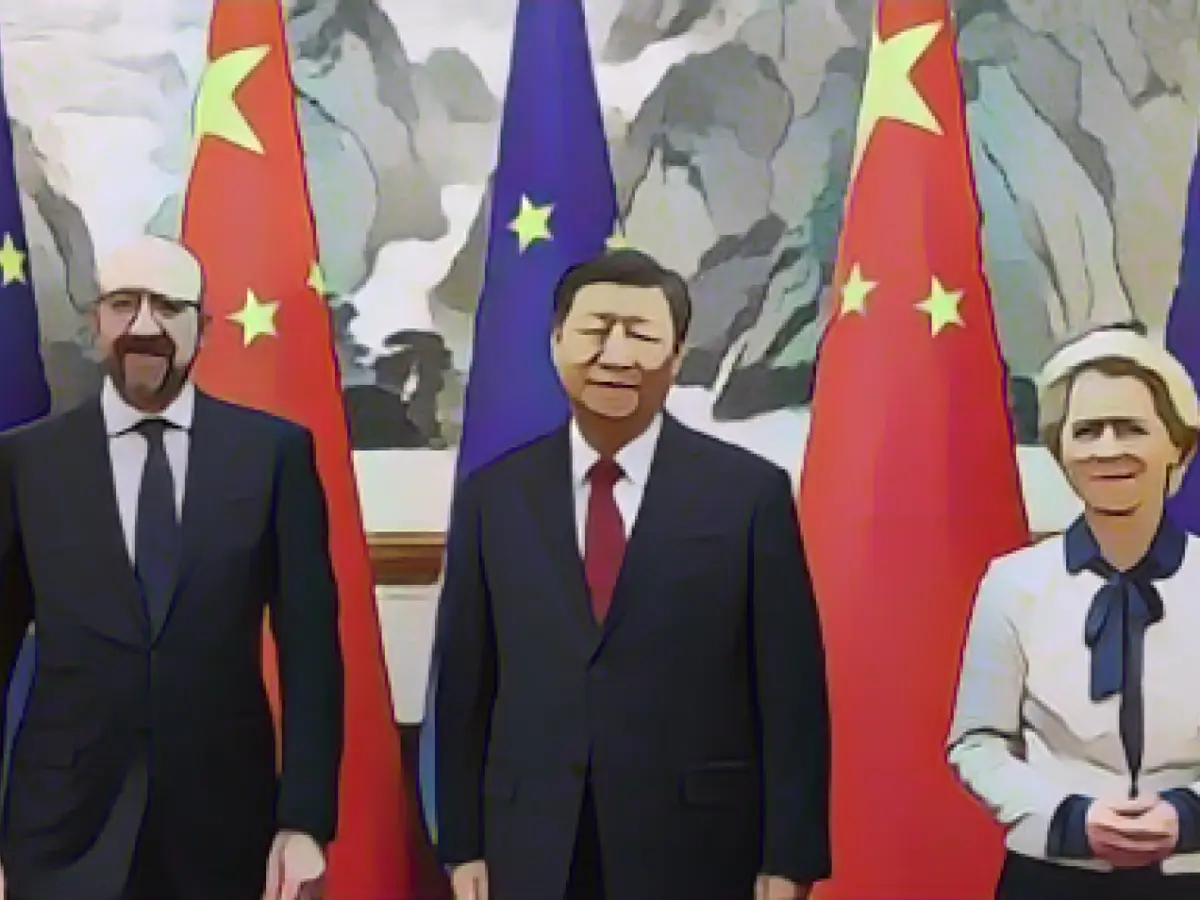Von der Leyen raises "imbalances" in trade at EU-China summit
"Sometimes our interests coincide," said von der Leyen at the start of the first face-to-face meeting between EU leaders and the Chinese head of state in more than four years, referring to the cooperation between the EU and China on climate policy and artificial intelligence. "And if they disagree, we need to address the concerns we have and deal with them responsibly," she said.
Michel said the EU was seeking a "stable and mutually beneficial" relationship with China. But the EU would also reaffirm "European values, including human rights and democracy" at the summit. Xi said that China and the EU must "jointly respond to global challenges".
In addition to topics such as climate change and health, more controversial issues such as the human rights situation in China and Beijing's cooperation with Moscow despite the war in Ukraine were also to be discussed at the summit in Beijing.
Von der Leyen had already called on China to compromise on trade disputes in the run-up to the summit. "The European heads of state and government will not tolerate an imbalance in trade relations in the long term," she said in an interview on Tuesday. "We have instruments at our disposal to protect our market." Beijing responded by saying that the EU's efforts to curb the export of sensitive technology to China in order to achieve a balance in trade made "no sense".
Italy's withdrawal from the Chinese New Silk Road investment offensive was announced on Wednesday. Italy, the EU's third-largest economy, was the only G7 country to join the project launched by Xi, which has led to the construction of ports, railroad lines, airports and industrial parks, primarily in Asia, Africa and Europe, since 2013. The projects are intended to give China better access to the markets of other countries.
There is frequent criticism, particularly in the West, that Beijing is deliberately driving poorer countries into dependency. Many participating countries have run up massive debts in some cases. As Italian Prime Minister Giorgia Meloni strictly rejects Italy's participation in the New Silk Road, the withdrawal came as no surprise. On Thursday, Beijing criticized Italy for "undermining" the project with its withdrawal.
In addition to the trade imbalance, the Russian war of aggression against Ukraine and the war in the Middle East were also to be discussed at the EU-China summit. Von der Leyen also wanted to call on Beijing to lift sanctions against European politicians.
China had imposed entry bans and other measures in 2021, including against MEP and former co-leader of the German Greens, Reinhard Bütikofer. This was Beijing's response to EU sanctions due to the oppression of the Muslim Uyghur minority in China.
The schedule of the EU leaders in Beijing was tight: Following the meeting with Xi, von der Leyen and Michel wanted to hold talks with China's head of government Li Qiang. In the evening, an official dinner and a press conference were on the agenda.
Read also:
- This will change in December
- German activists speak out in Dubai on suffering in Israel and the Gaza Strip
- Nuclear fusion - hype or solution to energy problems?
- Budget crisis fuels debate on citizen's income - Bas warns against populism
- At the EU-China summit, Ursula von der Leyen raised concerns about "imbalances" in the trade relationship between the EU and China.
- Borrell, as the EU's foreign policy chief, will also likely address contentious issues like democracy and human rights when negotiating with Beijing.
- The EU leaders, including Charles Michel, are committed to maintaining a "stable and mutually beneficial" relationship with China, but they emphasize the importance of upholding European values.
- The discussions at the summit will also touch on Moscow's cooperation with Beijing despite the ongoing conflict in Ukraine.
- From the perspective of the EU, it is crucial to address the "imbalance" in trade relations to protect its own market in the long term.
- The EU leaders' tight schedule in Beijing includes meetings with top Chinese officials, such as Li Qiang, to discuss various topics, including the imbalance in trade relations.
- Italy's withdrawal from the Chinese New Silk Road investment offensive further exacerbates the trade imbalance between Europe and China.
- The withdrawal of Italy, the EU's third-largest economy, from the New Silk Road project has led to criticism from Beijing, which sees it as undermining the project.
- The EU is also expected to address the issue of China's entry bans and other measures against European politicians, such as Reinhard Bütikofer, during the summit.
- Xi Jinping, China's head of state, calls for joint action between China and the EU to address global challenges during the EU-China summit.
- Peking is resistant to the EU's efforts to curb the export of sensitive technology, arguing that such measures make no sense in achieving a balance in trade relations.
- The relationship between the EU and China will be tested during the EU-China summit, with both sides discussing controversial issues and seeking mutually beneficial solutions while respecting their shared values and promoting peace and stability.
Source: www.stern.de







